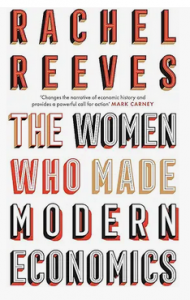It has been a bit of a week, trying to get my dear husband the right medical care after he fell and smashed his elbow in the rain and darkness just over a week ago. Although he’s, thankfully, patched up with mesh, sellotape etc now, my concentration hasn’t been terrific. So mainly I’ve been reading detective novels. However, I did notice that Rachel Reeves’s book, The Women Who Made Modern Economics, has been published. I read a proof copy a little while ago, and would recommend it.
There are really two books combined here. One is a straightforward account of the work of important and often overlooked women economists, such as Beatrice Webb and Mary Paley Marshall via academics like Joan Robinson and Esther Duflo, all the way through to influential policy economists Christine Lagarde and Janet Yellen. As well as being mini-histories, these sections aim to show why and how being female influenced for the better the economics, by bringing to bear a different kind of experience or understanding of the context in which policies operate. They are nicely written, and I wholeheartedly agree on the importance of diverse experience to improve economic analysis, but the biographical details are not novel.
The second element is more interesting in the present political context, namely the picture the book paints of Reeves’s own framework for thinking about economic policy, which she grounds in her own life experience and in the ideas of the economists she writes about. Given that this highly impressive politician looks increasingly likely to be the UK’s next Chancellor, this is of real interest. I think the book paints a pretty coherent picture of a strategic approach to the supply side of the economy, combined with a clear-eyed view about the importance of macroeconomic stability, and the strong sense of social justice you would hope for from a senior Labour figure. Reeves rejects simplistic ‘free marketism’ while being obviously in favour of businesses succeeding. She emphasises the importance of taking into account unpaid care, still typically women’s work. She attacks the continuing gender pay gap and Britain’s retreat from overseas aid.
Reeves is of course an economist by training and by work experience (Bank of England and the banking sector). There are specifics I might disagree with her about – but her economic philosophy as set out here is consistent and credible. Of course, all the good sense on display in her analysis will be needed, given the legacy being left by the present government for its successor.
Folks, we might be in line for a Chancellor with a sound grasp of economics beyond the textbook (or the blackboard, to use Coase’s term) and an interesting hinterland. The two strands of The Women Who Made Modern Economics don’t, in my view, sit together comfortably; the ‘lessons’ drawn from the historical figures for some aspect of modern policy, to link the strands together, are a bit strained. But the sense and coherence of Reeves’s personal manifesto for the economy makes it well worth a read.

